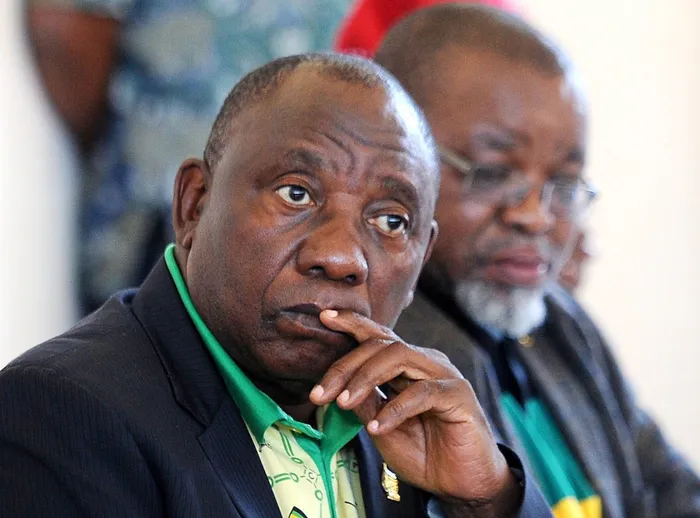
ActionSA has filed a PAIA application to gain access to the IPID report in to the Phala Phala matter.
Image: Ayanda Ndamane
THE fight to hold President Cyril Ramaphosa accountable over the Phala Phala saga appears far from over as ActionSA has now set its sights on having access to the information that led to the Independent Police Investigative Directorate's (Ipid) report being shelved from the public.
The investigation relates to the alleged cover up of the theft of hundreds of thousands of US dollars in cash from Ramaphosa’s couches on his Phala Phala farm, in Limpopo in 2020.
Despite there being no police case opened, state resources including sophisticated machines used to intercept devices were used to track down the suspects who stole the cash. Once found, among them in Cape Town, the suspects were allegedly assaulted to disclose the whereabouts of the remaining cash. Some of it had already been spent on high end vehicles, jewellery and property in Namibia.
In 2022, the African Transformation Movement (ATM) wrote to Ipid requesting an investigation into the alleged police cover-up. However, in a written reply to a parliamentary question by ATM leader Vuyo Zungula in February, Police Minister Senzo Mchunu, said the report related to the investigation was "top secret" and would not be made public, sparking public outcry.
ActionSA weighed in on the matter on Tuesday by confirming that it recently submitted an application, in terms of the Promotion of Access to Information Act (PAIA), to obtain the Ipid report.
In response to the Cape Times’ questions, Ipid confirmed they received the application but maintained the report remained classified.
“IPID received a request for information from ActionSA on April 22, 2025. Their request was acknowledged on April 23, 2025 and (they) were advised to provide more detail on their request as well as to use the correct form, which was emailed to them. “In terms of PAIA, our turnaround time to respond to any requests for information is 30 days. It should also be noted that the Phala Phala Report remains classified,” said Ipid spokesperson Lizzy Suping.
ActionSA national chairperson Michael Beaumont has maintained that despite several reports, the public still “does not have access to the information it rightfully deserves”.
Classifying a report top secret according to parliamentary policies was only applicable to information that could lead to the declaration of war, the severing of diplomatic ties between states, significant damage to inter-institutional operations, or the disruption of strategic information planning qualifies for such a classification, said the party.
“It must be stressed that a Cabinet policy is subordinate to higher legislation, including the Promotion of Access to Information Act and the Constitution of the Republic of South Africa. The filing of this PAIA application is a fulfilment of our promise to demand transparency from the grand coalition government and to ensure that its leaders act with ethical consideration. ActionSA will continue to serve as an uncompromised, unofficial opposition, filling the void left by former opposition parties that stampeded for power last year. Transparency is not optional. It can never be subjected to political compromise, and it is needed now more than ever, with a colossal GNU constituting 70% of the South African Parliament. South Africans deserve answers on Phala Phala, and ActionSA's application is one step towards ensuring those answers are delivered," Beaumont said.
The party was also willing to take the matter to court if necessary.
Reacting to ActionSA’s application, Zungula, who has also called for the report to be made public, said: “This is a good move in the fight for accountability and the rule of law. People occupying public office must know they will be held accountable and their actions will be scrutinised even if they attempt to conceal wrongdoing. Transparency is critical to ascertain which public institutions acted in violation of law. The PPS unit attached to the President is still operating yet they were involved in a police cover-up.”
Political analyst professor Sipho Seepe said it would be a "grave mistake" if the Phala Phala matter were allowed to die as it had brought all law enforcement agencies' conduct into disrepute.
"There’s an attempt to hide the seriousness of the Phala Phala matter but it won't go away and it must not go away because it touches on the integrity of the post-1994 democracy. One must understand the number of levels it is wrong. We have always tried to believe in the judges. When the judges make pronouncements, we take that very seriously. Here you have a respected retired judge, a senior counsel whose job is superior in their understanding of assessing evidence before them. Those people have made a pronouncement that the president has a case to answer," he said.
His remarks were in reference to a Parliamentary panel led by retired chief justice Sandile Ngcobo, which found that Ramaphosa may have violated his office over the Phala Phala saga. That report still stands despite the ANC using its majority in the previous administration to vote against its adoption in Parliament.
The Presidency did not respond to requests for comment by deadline.
Cape Times
Related Topics: